- Home
- Gail Carriger
The Parasol Protectorate Boxed Set Page 13
The Parasol Protectorate Boxed Set Read online
Page 13
She pretended interest in a group of swans floating across a pond to one side of the track. In truth, it was Professor Lyall who had caught her attention. Had he stumbled? It looked as though he had, falling against another gentleman and causing that man to drop some sort of metal device.
“So what topic will you address at the Hypocras inauguration?” Miss Tarabotti asked.
Mr. MacDougall coughed. “Well”—he looked embarrassed—“primarily what I have found the soul not to be. My initial research would seem to indicate that it is not an aura of any kind nor a pigmentation of the skin. There are several working theories: some think it may reside in part of the brain; others believe it to be a fluid element in the eyes or perhaps electrical in nature.”
“What do you think?” Alexia was still feigning interest in the swans. Professor Lyall seemed to recover himself. It was hard to tell at this distance, but, under his John Bull hat, his angular face seemed oddly pale.
“From what I know of metamorphosis—and I have never been privileged enough to observe it in action, mind you—I believe the conversion to be the result of a blood-borne pathogen. The same kind of pathogen Dr. Snow has suggested resulted in the recent cholera outbreaks.”
“You oppose the miasmatic hypothesis of disease transfer?”
The scientist inclined his head, delighted to converse with a woman so well educated in modern medical theory.
Miss Tarabotti said, “Dr. Snow suggests cholera transmission occurred through the ingestion of contaminated water. How exactly would you suggest supernatural transmission occurs?”
“That remains a mystery. As does the reason why some respond positively and others do not.”
“A condition that we currently refer to as the presence or absence of excess soul?” suggested Alexia.
“Exactly.” The scientist’s eyes brightened with enthusiasm. “Identifying a pathogen will only show us what occurs to drive metamorphosis. It will not tell us why or how. My research until now has focused on hematology, but I am beginning to think I have been pursuing the wrong hypothetical angle.”
“You need to deduce what is different between those who die and those who survive?” Alexia tapped the brass handle of her parasol with her fingertips.
“And what the survivor is like before and after metamorphosis.” Mr. MacDougall drew the horses up so he could turn fully to face Alexia, animated in his enthusiasm. “If the soul has substance, if it is an organ or part of an organ that some possess and others do not—the heart, perhaps, or the lungs—”
Miss Tarabotti was equally enthusiastic; she finished the hypothesis for him. “Then it should be quantifiable!” Her dark eyes sparkled with the very idea of such a thing. Brilliant in concept, but it would require much further study. She understood now why he had not thought his research appropriate dinner conversation the evening before. “You are undertaking a number of cadaverous dissections?” she asked.
Mr. MacDougall nodded, having forgotten her ladylike sensibilities in his excitement. “But I am finding it most difficult to acquire dead werewolves and vampires for comparison. Particularly in the United States.”
Miss Tarabotti shuddered. No need to ask why. Everyone knew the Americans burned to death any accused of being supernatural, leaving little behind for any scientist to study. “You think to procure specimens here and transport them back?”
The scientist nodded. “I hope that it will be considered in the best interest of science to pursue this kind of inquiry.”
“Well,” Alexia said, “your speech at Hypocras should pave the way if it at all approaches the conversation we are having. You have some of the newest and best ideas I have yet heard on the subject. You would have my vote of confidence, were I allowed to be a member of the club.”
The young man grinned at her praise and began to think ever more fondly of Miss Tarabotti, who possessed enough intelligence to not only follow his thoughts, but perceive their worth as well. He tsked his horses into motion once more, guiding them off to one side of the path. “Did I mention how lovely you are looking today, Miss Tarabotti?” He pulled the carriage to a full stop.
Of course, Alexia could hardly point out the many flaws in his theories after such a compliment. So instead she steered their conversation on to more general topics. Mr. MacDougall cranked up the mechanical water boiler and brewed a pot of tea. Alexia used the carriage’s monocular distance viewing device while he did so. She tilted the lenses about, commenting on the pleasures of a sunny day and the statuesque grace of distant dirigibles floating above the park. She also trained them briefly on Professor Lyall, who was leaning in the shade of a tree a little way away, only to find he had donned his glassicals and was watching her through them. She hurriedly put the optical magnification device down and turned amiably back to her host and tea.
While she sipped cautiously at the tin mug, surprised to find the offering a delicious Assam, he lit up the small hydraulic engine she had noticed at the back of the carriage. With much creaking and groaning, a massive parasol pulled itself upright and then unfolded to shade the open carriage. Alexia snapped her own small parasol shut, glaring at it with an entirely unwarranted sense of inadequacy. It was a good little parasol and hardly deserving of such a jaundiced look.
They passed a distinctly pleasant additional hour in each other’s company, sipping tea and nibbling a box of rosewater and lemon Turkish delight that Mr. MacDougall had invested in for this occasion especially. In no time, it seemed, Mr. MacDougall was lowering the gigantic parasol and driving Miss Tarabotti back home.
The young gentleman helped her down from his carriage at the Loontwills’ front steps feeling justifiably pleased with the success of their outing, but Alexia forestalled him when he tried to see her all the way to the door.
“Please do not mistake my refusal for rudeness,” she explained delicately. “But you do not wish to encounter my relations just now. They are not up to your caliber of intellect, I am ashamed to say.” She suspected her mother and sisters were out shopping, but she needed some excuse. The way his eyes looked right now, he might make a declaration, and then where would she be?
The scientist nodded gravely. “I completely understand, my dear Miss Tarabotti. My own relatives are similarly afflicted. May I call again?”
Alexia did not smile. It would not do to be coy when she had no intention of returning his advances. “You may, but not tomorrow, Mr. MacDougall. You will be preparing for your speech.”
“The next day?” He was persistent. “That way I can tell you how the opening celebrations went.”
Very forward, American men. Alexia sighed inwardly but nodded her acquiescence.
Mr. MacDougall assumed the driver’s seat, tipped his hat, and urged his chestnut beauties into a sedate withdrawal.
Miss Tarabotti pretended she was remaining on the stoop to wave him off. Once he was out of sight, however, she nipped furtively back down the front steps and round the side of the house.
“You certainly kept a close watch,” she accused the man lurking there.
“Good afternoon, Miss Tarabotti,” he said in a polite if mild voice—milder than usual, even for Professor Lyall, almost weak sounding.
Alexia frowned in concern. She tried to get a good look at his face under the ostentatious hat. “How came you to be on duty today, sir? I would have thought Lord Maccon required your expertise elsewhere.”
The professor looked pale and drawn, normal in a vampire but not in a werewolf. The lines on his face had deepened with strain, and his eyes were bloodshot. “Miss Tarabotti, it is getting on to full moon; his lordship has to be careful who he puts out to guard you come daylight. The young ones are not very stable at this time of the month.”
Alexia sniffed. “I appreciate his concern for my well-being. But I had thought there were others in BUR who might not be so taxed by daylight service. When is the moon?”
“Tomorrow night.”
Miss Tarabotti frowned. “Same time as Mr. MacDou
gall’s speech at the Hypocras Club,” she said softly to herself.
“What?” The professor looked too tired to be interested.
Alexia waved a hand in the air. “Oh, nothing of import. You should go home, Professor, get some rest. You look absolutely awful. He should not work you so hard.”
The Beta smiled. “It is part of my purpose.”
“To exhaust yourself protecting me?”
“To safeguard his interests.”
Miss Tarabotti gave him a horrified look. “I hardly think that an apt description.”
Lyall, who’d seen the crested carriage parked just the other side of the Loontwill house, did not reply to that.
There was a pause.
“What did he do?” Alexia asked.
“Who?” replied Professor Lyall, although he knew perfectly well what she was asking about.
“The man you pretended to stumble into.”
“Mmm.” The werewolf was cagey. “It was more what he had.”
Miss Tarabotti tilted her head and looked inquiring.
“I wish you a pleasant evening, Miss Tarabotti,” said Professor Lyall.
Alexia gave him an exasperated look, then marched back up the front stairs and inside her house.
The family was clearly out, but Floote was waiting for her in the foyer with a most un-Floote-like expression of perturbation on his face. The door to the front parlor was open, a certain sign of visitors. Alexia was shocked. The Loontwills could not possibly have been expecting company, otherwise they would never have left the premises.
“Who is here, Floote?” she asked, fumbling with her hatpin.
The butler raised both eyebrows at her.
Alexia swallowed, suddenly nervous. She removed her hat and gloves and put them carefully on the hall table.
She took a moment to compose herself, checking her hair in the framed gilt hallway mirror. The dark mass was arranged a tad long for daytime, but she had a bite mark to cover up, and it was too hot for high necklines. She twitched several curls into place to better cover her bruise. Her own face looked back at her: firm chin, dark eyes, militant expression. Alexia touched her nose. Mr. Mac-Dougall thinks you are lovely, she told her reflection.
Then she set her spine as straight as possible and marched into the front parlor.
Lord Conall Maccon whirled about from where he stood. He had been facing the closed velvet curtains of the front window, staring at them as though he might be able to see right through the heavy material. In the dim light of the room, his eyes looked accusatory.
Miss Tarabotti paused on the threshold. Without a word, she turned back around, reached out, and slammed the parlor door shut firmly behind her.
Floote gave the closed door a long, hard look.
Outside in the street, Professor Lyall set his bone-weary self toward the BUR offices—just a few more records to check before bed. With one free hand, he patted a new bulge in his many-pocketed waistcoat. Why, he wondered, was a man with a syringe wandering Hyde Park? He turned back once to look at the Loontwills’ house. A sudden smile creased his angular face as he noted the Woolsey Castle carriage waiting nearby. Its crest shone in the late afternoon sun: a quartered shield, two parts a moon-backed castle, two parts a moonless starry night. He wondered if his lord and master would, in fact, grovel.
The Earl of Woolsey wore a suit of dark chocolate, a cravat of caramel silk, and an air of ill-disguised impatience. He had been holding his kid gloves in one hand and slapping them rhythmically into the other when Miss Tarabotti entered the front parlor. He stopped instantly, but she had noted the fidget.
“What bee has gotten into your britches?” Miss Tarabotti asked without any attempt at a formal greeting. Formality was wasted on Lord Maccon. She took up position, arms akimbo, standing on the round primrose rug before him.
The earl countered with a gruff “And where have you been all day?”
Miss Tarabotti was disposed to be elusive. “Out.”
The earl would have none of it. “Out with whom?”
Alexia raised both eyebrows. He would find out from Professor Lyall eventually, so she said archly, “A nice young scientist.”
“Not that butterball chap you were nattering away with at dinner last night?” Lord Maccon looked at her in horror.
Miss Tarabotti glared viciously down her nose at him. Inside she was secretly delighted. He had noticed! “It just so happens that Mr. MacDougall has some absolutely fascinating theories on a wide range of topics, and he is interested in my opinion. Which is more than I can say for certain other gentlemen of my acquaintance. It was a beautiful day and a lovely drive, and he makes for quite an enjoyable conversation partner. A position, I am certain, you are entirely unfamiliar with.”
Lord Maccon looked suddenly very suspicious. His eyes narrowed, and their color lightened to the same caramel hue as his cravat. “What have you been telling him, Miss Tarabotti? Anything I should know?”
He was asking in his BUR tone of voice.
Miss Tarabotti looked around, expecting at any moment to see Professor Lyall emerge with a notepad or a metal plate and stylus. She sighed with resignation. Clearly, the earl had come to visit her only in his official capacity. Foolish of her to hope, she chided herself mentally. Then she wondered what exactly she was hoping for. An apology? From Lord Maccon! Ha. She sat down on a small wicker chair to one side of the sofa, careful to keep a proper distance between them. “What is interesting is more what he has been telling me,” she said. “He thinks being supernatural is some kind of disease.”
Lord Maccon, who was a werewolf and “cursed,” had heard that description before. He crossed his arms and loomed at her.
“Oh, for goodness’ sake,” tsked Miss Tarabotti, “do sit down.”
Lord Maccon sat.
Miss Tarabotti continued. “Mr. MacDougall… that is his name, you know? Mr. MacDougall. Anyhow, Mr. MacDougall believes that the supernatural state is brought about by a blood-borne pathogen that affects some humans but not others, because some possess a certain physical trait and others do not. Presumably under this theory, men are more likely to possess said trait, and that is why they survive metamorphoses more frequently than women.”
Lord Maccon relaxed back, the tiny couch creaking under his weight. He snorted his contempt of the idea.
“There is, of course, one chief problem with his conjectures,” Alexia went on, ignoring the snort.
“You.”
“Mmmm.” She nodded. There was no room in Mr. MacDougall’s theory for those who had no soul at all and canceled out those who had too much. What would Mr. MacDougall make of a preternatural? Assume she was a kind of proximity antidote to the supernatural disease? “Still it is an elegant theory with what little knowledge he has to go on.” She did not have to say that she respected the young man who had thought of it. Lord Maccon could see that in her face.
“So wish him joy of his delusions, and leave it be,” the earl said grimly. His canines were beginning to show, and the color of his eyes had gone further toward the yellow end of brown.
Miss Tarabotti shrugged. “He shows interest. He is smart. He is wealthy and well connected, or so I understand.” He thinks I am lovely. She did not say that out loud. “Who am I to complain at his attentions, or discourage them for that matter?”
Lord Maccon had cause to regret the words he had uttered to Professor Lyall the night Alexia killed the vampire. Apparently she was thinking of getting married. And she seemed to have found someone to marry her, despite being half Italian. “He will take you back to America, and you a preternatural. If he is as smart as you imply, he would figure that little fact out eventually.”
Miss Tarabotti laughed. “Oh, I am not thinking of marrying him, my lord. Nothing so rash. But I enjoy his company; it relieves the monotony of the day, and it keeps the family off the offensive.”
Lord Maccon felt a rush of palpable relief at this blithe assurance and was annoyed with himself for it. Why should he c
are so much? His canines retracted slightly. Then he realized she had specified marry and that in his experience, she was rather modern in her sensibilities for a spinster. “You are considering something else non-marriage with him, perhaps?” His voice was practically a growl.
“Oh, for pity’s sake. Would it bother you if I were?”
Lord Maccon actually sputtered slightly at that.
Alexia suddenly realized what she was doing. She was sitting, having a polite conversation with Lord Conall Maccon, Earl of Woolsey—whom she did not like and with whom she was supposed to be extremely annoyed—about her romantic involvement (or lack thereof). It was just that his presence caused her to become overall addlepated.
She closed her eyes and took a deep breath. “Wait a moment. Why am I speaking with you at all? My lord, your behavior last night!” She stood and began to swish about the cluttered little room, her eyes sparking fiercely. She pointed an accusatory finger at him. “You are not simply a werewolf; you, my lord, are a rake. That is what you are! You took advantage the other night, Lord Maccon. Admit it! I have no idea why you felt it necessary to do”—she paused, embarrassed—“what you did, the evening of my near abduction. But you have clearly since thought better of it. Why, if you were not interested in me as anything more than a”—she stumbled, trying to find the right terminology—“momentary plaything, you might at least have just told me outright afterward.” She crossed her arms and sneered at him. “Why didn’t you? You think I was not strong enough to take it without causing a scene? I assure you, no one is better used to rejection than I, my lord. I think it very churlish of you not to inform me to my face that your breach in manners was an unfortunate impulse of the moment. I deserve some respect. We have known each other long enough for that at the very least.” At that, her steam began to run out, and she felt a heat behind her eyes she refused to believe might be tears.
Now Lord Maccon was getting angry but for different reasons. “So you’ve figured it all out, have you? And why, pray tell, would I suddenly be thinking better of my… what did you call it? Unfortunate impulse of the moment?” He sounded particularly Scottish. Alexia would have been amused by the fact that the more angry the earl got, the more burr crept into his speech. But she was too angry to notice. All tears had retracted at that.

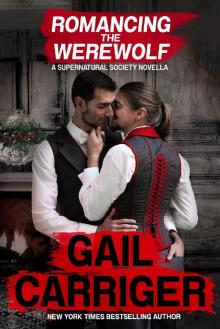 Romancing the Werewolf
Romancing the Werewolf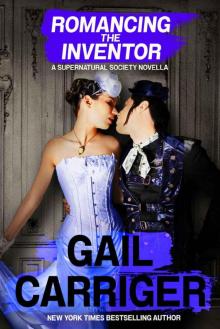 Romancing the Inventor
Romancing the Inventor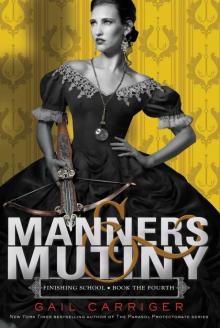 Manners & Mutiny
Manners & Mutiny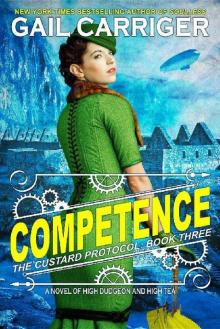 Competence
Competence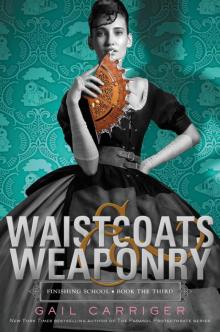 Waistcoats & Weaponry
Waistcoats & Weaponry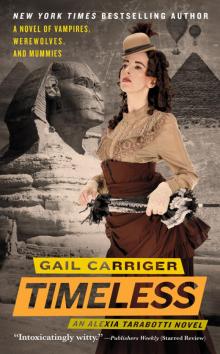 Changeless
Changeless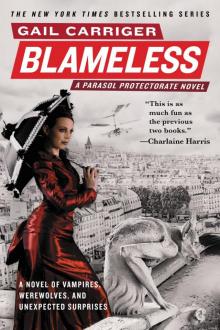 Blameless
Blameless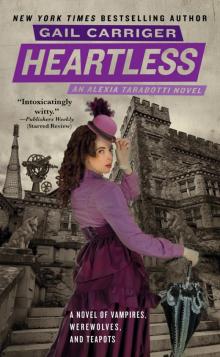 Soulless
Soulless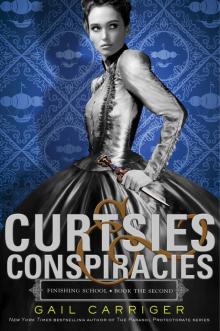 Curtsies & Conspiracies
Curtsies & Conspiracies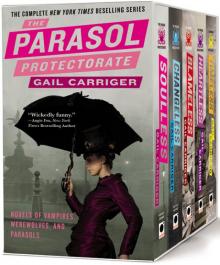 The Parasol Protectorate Boxed Set
The Parasol Protectorate Boxed Set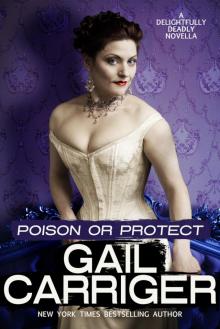 D2D_Poison or Protect
D2D_Poison or Protect Funny Fantasy
Funny Fantasy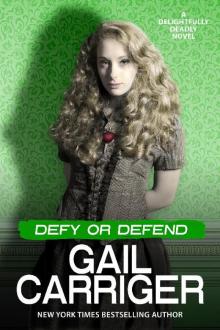 Defy or Defend
Defy or Defend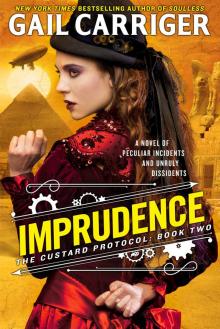 Imprudence
Imprudence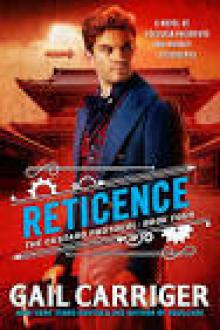 Reticence
Reticence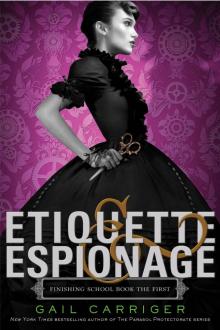 Etiquette & Espionage
Etiquette & Espionage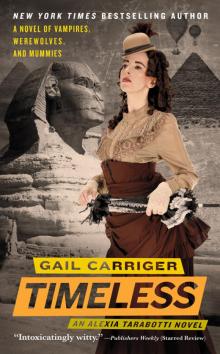 Heartless
Heartless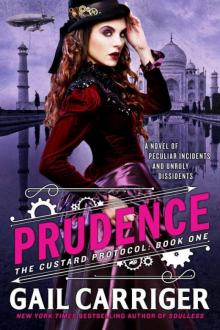 Prudence
Prudence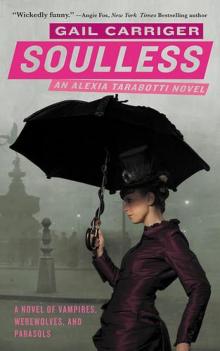 Parasol Protectorate 01 - Soulless
Parasol Protectorate 01 - Soulless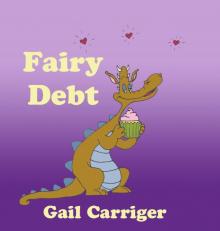 Fairy Debt
Fairy Debt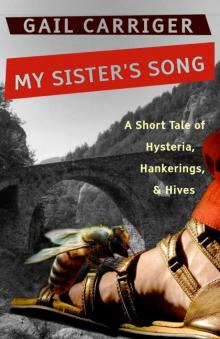 My Sister's Song
My Sister's Song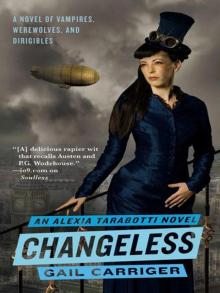 Changeless: The Parasol Protectorate: Book the Second
Changeless: The Parasol Protectorate: Book the Second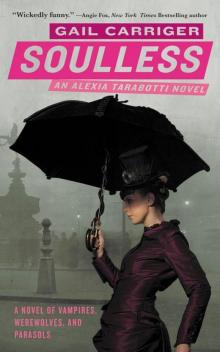 Soulless: The Parasol Protectorate: Book the First
Soulless: The Parasol Protectorate: Book the First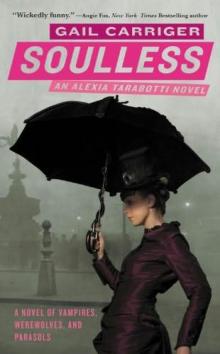 Soulless pp-1
Soulless pp-1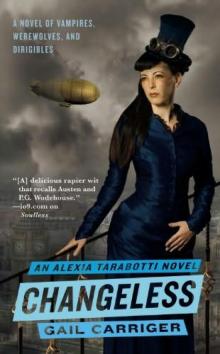 Changeless pp-2
Changeless pp-2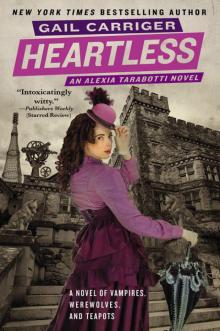 Heartless: The Parasol Protectorate: Book the Fourth
Heartless: The Parasol Protectorate: Book the Fourth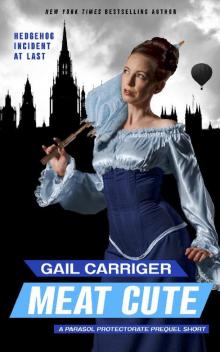 Meat Cute
Meat Cute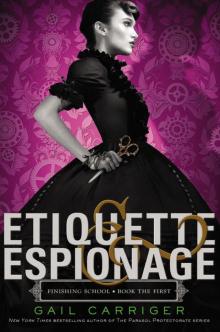 Etiquette & Espionage (Finishing School)
Etiquette & Espionage (Finishing School)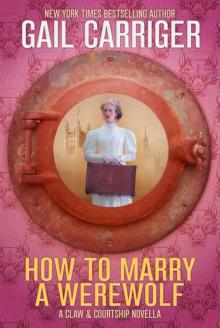 How To Marry A Werewolf (Claw & Courtship Novella Book 1)
How To Marry A Werewolf (Claw & Courtship Novella Book 1)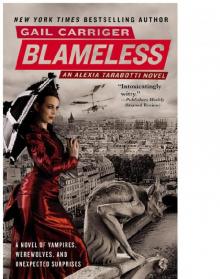 Blameless: The Parasol Protectorate: Book the Third
Blameless: The Parasol Protectorate: Book the Third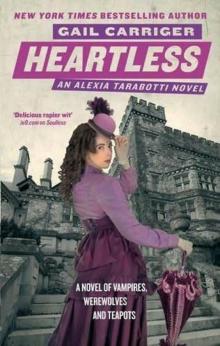 Heartless pp-4
Heartless pp-4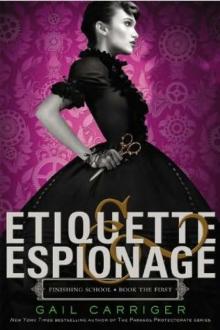 Etiquette & Espionage fs-1
Etiquette & Espionage fs-1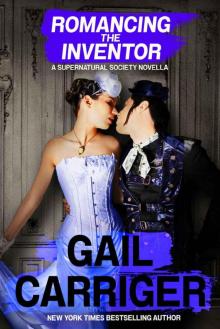 Romancing the Inventor: A Supernatural Society Novella
Romancing the Inventor: A Supernatural Society Novella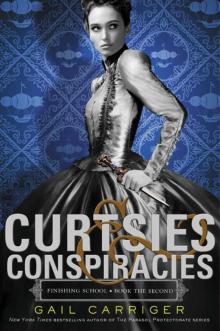 Curtsies & Conspiracies fs-2
Curtsies & Conspiracies fs-2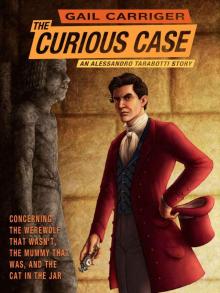 The Curious Case of the Werewolf That Wasn't, the Mummy That Was, and the Cat in the Jar (The Parasol Protectorate Book 6)
The Curious Case of the Werewolf That Wasn't, the Mummy That Was, and the Cat in the Jar (The Parasol Protectorate Book 6)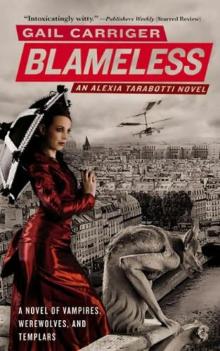 Blameless pp-3
Blameless pp-3